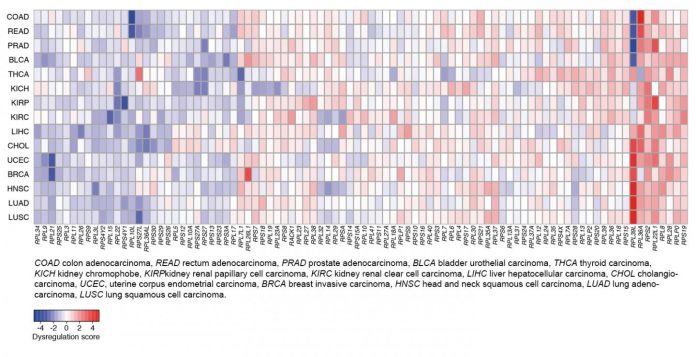
A team of investigators at the University of Basel's Biozentrum that has been researching the expression of ribosomal proteins in a wide range of human tissues, including tumors recently discovered a cancer type specific signature. The findings from this new study, published recently in Genome Biology through an article entitled “Patterns of ribosomal protein expression specify normal and malignant human cells,” describe a cancer signature that could potentially be used to predict the progression of the disease.
The University of Basel team has discovered that about a quarter of ribosomal proteins have tissue-specific expression, and that different cancer types have their own individual expression pattern of ribosomal proteins. In the future, these patterns may serve as a prognostic marker for cancer and may point towards new therapeutic opportunities.
Ribosomes are responsible for protein synthesis and are thus essential for the cell. Therefore, it has long been assumed that the expression of the individual components of the ribosomes is strictly controlled and invariant. However, a few studies have already suggested that the expression of individual ribosomal proteins is altered in cancers as well as in diseases of the hematopoietic system such as acute lymphoblastic leukemia.
In the current study, the investigators were able to analyze ribosomal protein expression in thirty tissue types, three hundred different cell types, and sixteen different types of tumors, such as lung and breast cancer. In contrast to previous assumptions, they found a wide variability in ribosomal protein gene expression. In particular, hematopoietic and tumor cells displayed the most complex expression pattern.
“For us, it was really impressive to see that consistent signatures emerged for the different cancer types after the analysis of distinct data sets including patient samples,” explained lead study investigator Joao Guimaraes, Ph.D., a postdoctoral fellow in computational biology at the University of Basel. “The pattern of the dysregulated proteins is very striking, whereby the expression of some ribosomal proteins is systematically reduced, and of others increased in cancer cells. This suggests that individual ribosomal proteins can either suppress or promote tumorigenesis.”
Interestingly, the scientists discovered a strong relationship between the “signature” in breast cancer and relapse-free survival. “We were quite surprised to find that the expression level of just three ribosomal proteins allows a fairly accurate prognosis of disease progression, comparable to the best predictive markers that are currently known,” noted senior study director Mihaela Zavolan, Ph.D., a professor at the Biozentrum within the University of Basel.
Dr. Zavolan went on to conclude that “our study demonstrates the potential of such expression signatures for the prognosis and perhaps a diagnosis of cancer. We are especially interested in studying the functions of individual ribosomal proteins and hopefully opening the door for new therapeutic options.”











